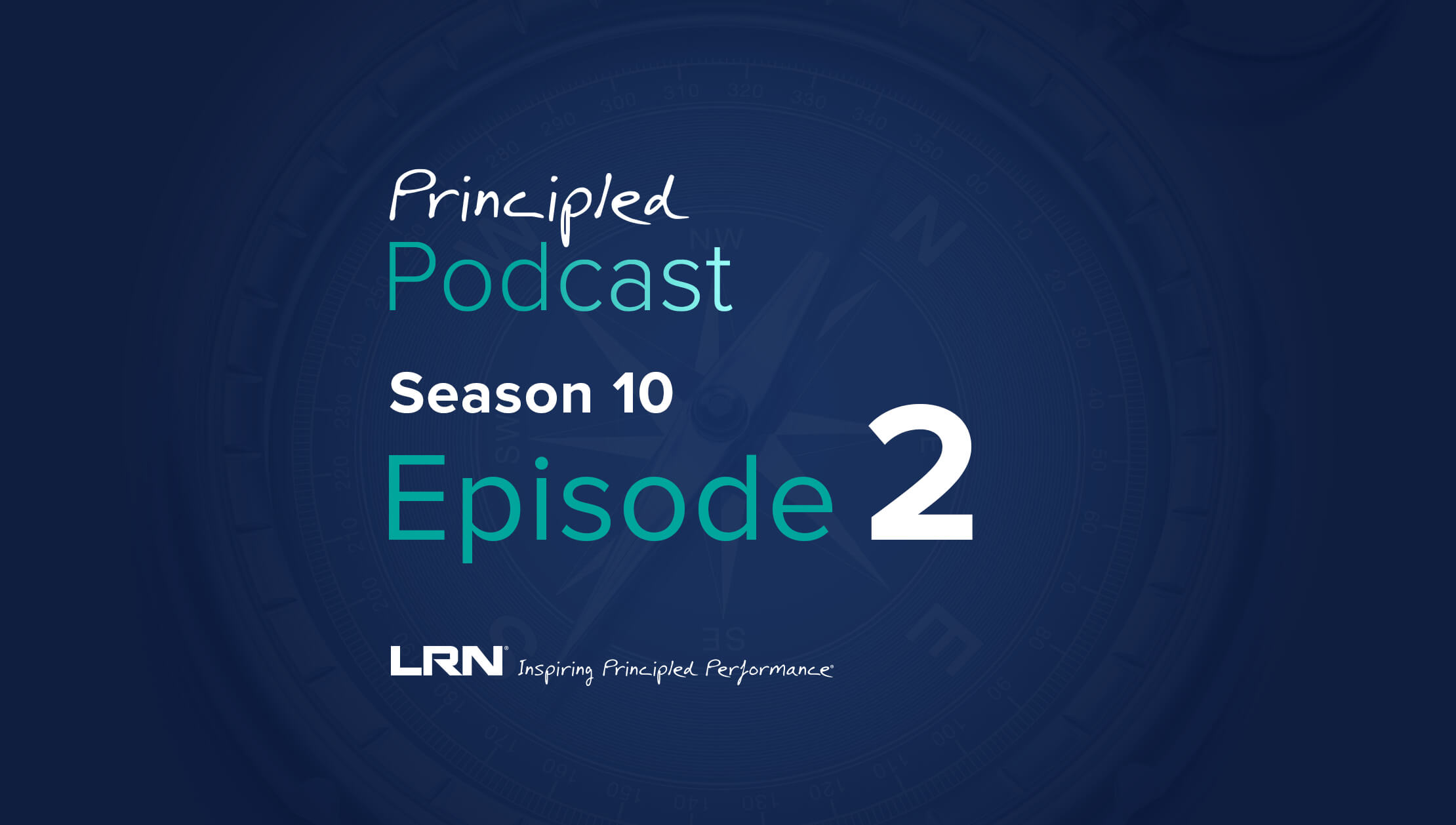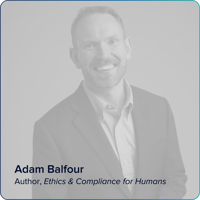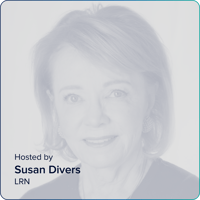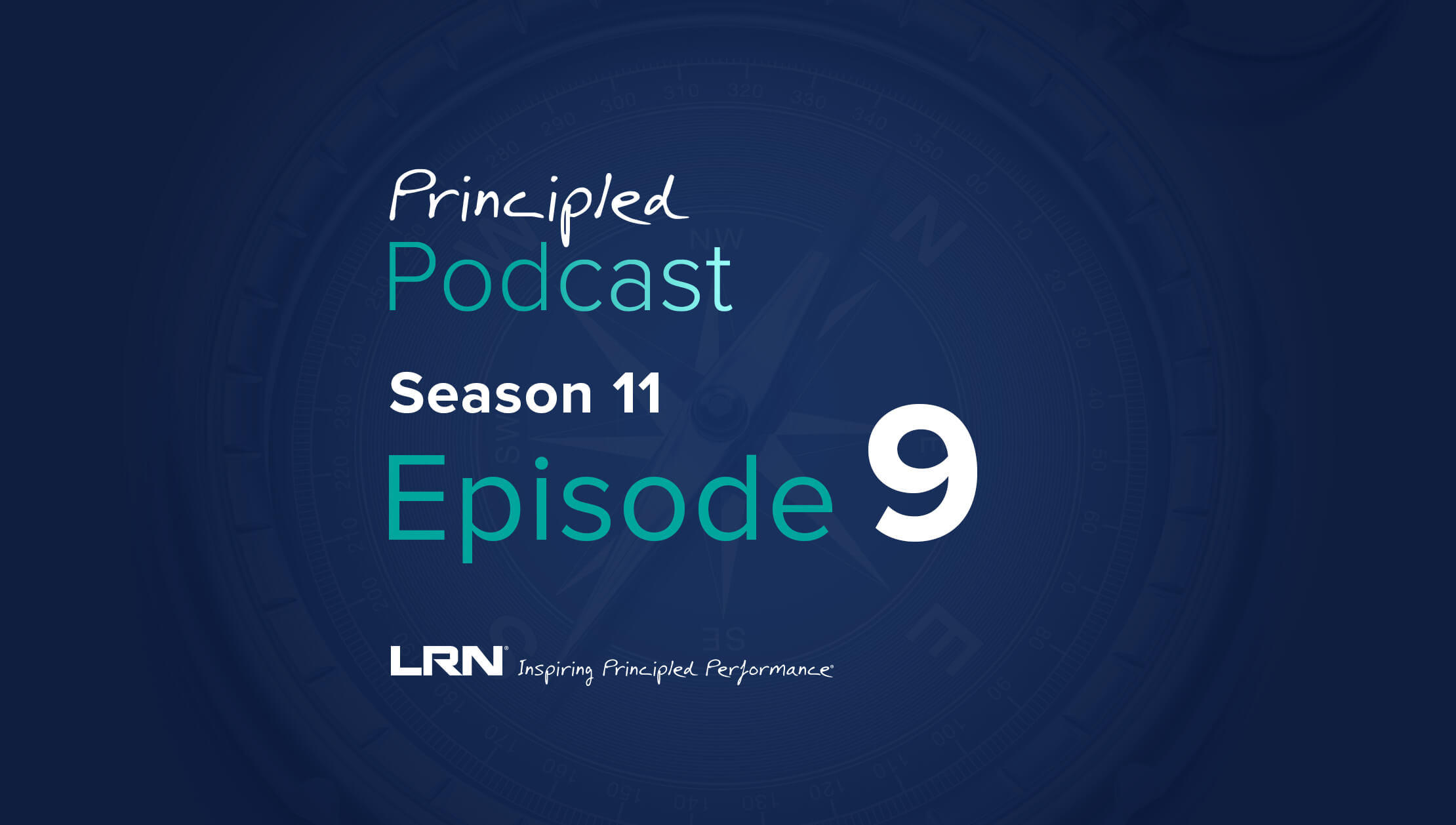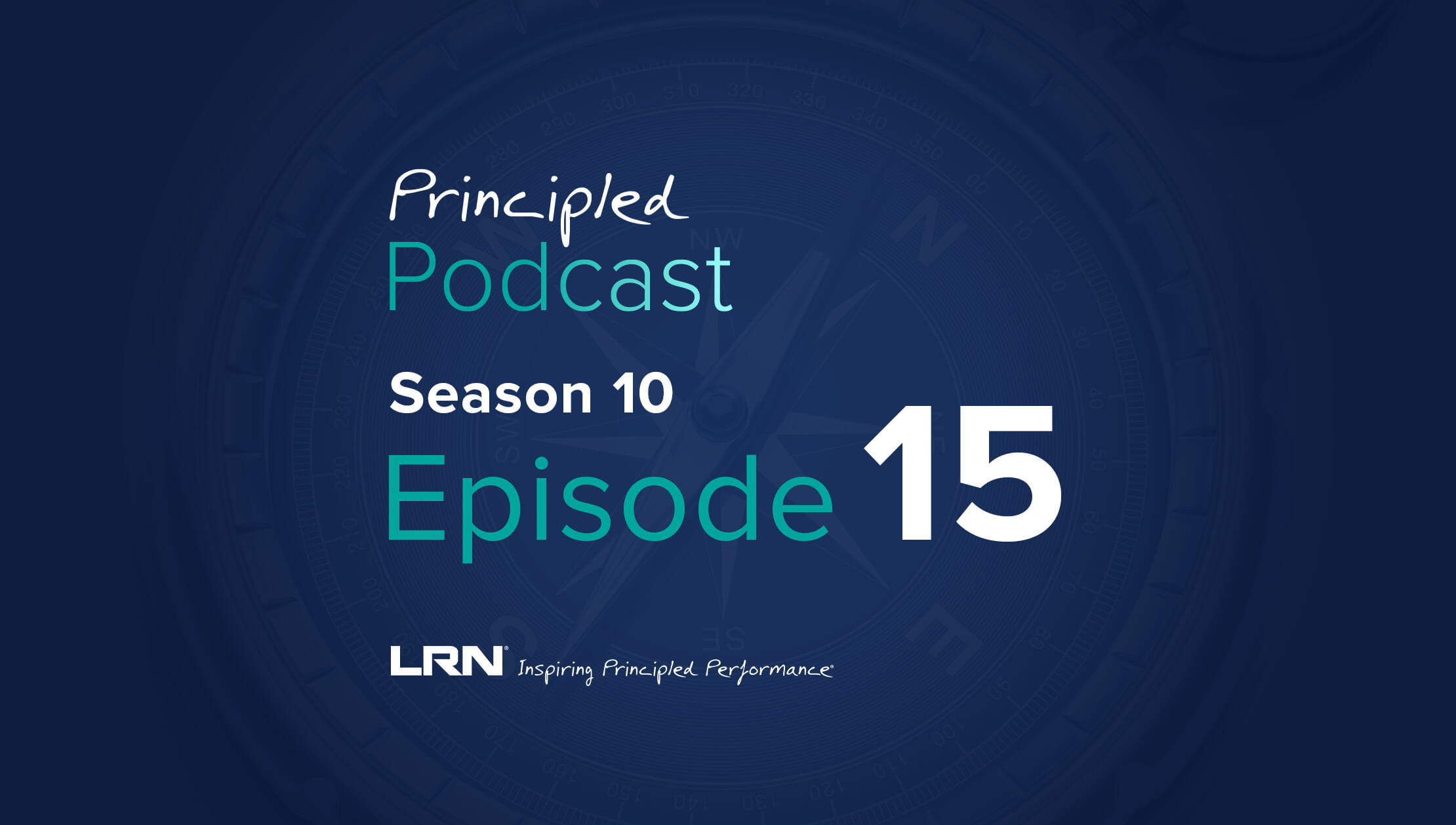What you'll learn on this podcast episode
Keeping the focus on the human element of ethics and compliance can help E&C programs move from “cop” to “coach.” But what does that look like in practice? In this episode of the Principled Podcast, host Susan Divers talks about the importance of humanizing ethics and compliance with Adam Balfour, the author of Ethics & Compliance for Humans. Listen in as the two discuss best practices that Adam has used over the course of his E&C career, managing regional and global ethics and compliance programs as well as leading areas of global risk management and privacy.
Where to stream
Be sure to subscribe to the Principled Podcast wherever you get your podcasts.
Guest: Adam Balfour
Adam Balfour is on a mission to help make ethics and compliance more relatable and relevant for his fellow human beings. He likes to design ethics and compliance programs that employees can actually relate to, engage with and find useful. Originally from Scotland, Adam worked for a number of years as an attorney for two international law firms in New York before moving to Nashville, Tennessee to work for Bridgestone. He is an active member in the ethics and compliance community, a co-editor of the "Compliance and Ethics: Ideas & Answers" newsletter together with Joe Murphy, Jeff Kaplan, and Rebecca Walker, and CCEP certified. His first book, Ethics & Compliance for Humans, was published by CCI Press and is available now.
Susan Divers is a senior advisor with LRN Corporation. In that capacity, Ms. Divers brings her 30+ years’ accomplishments and experience in the ethics and compliance area to LRN partners and colleagues. This expertise includes building state-of-the-art compliance programs infused with values, designing user-friendly means of engaging and informing employees, fostering an embedded culture of compliance and substantial subject matter expertise in anti-corruption, export controls, sanctions, and other key areas of compliance.
Prior to joining LRN, Mrs. Divers served as AECOM’s Assistant General for Global Ethics & Compliance and Chief Ethics & Compliance Officer. Under her leadership, AECOM’s ethics and compliance program garnered six external awards in recognition of its effectiveness and Mrs. Divers’ thought leadership in the ethics field. In 2011, Mrs. Divers received the AECOM CEO Award of Excellence, which recognized her work in advancing the company’s ethics and compliance program.
Mrs. Divers’ background includes more than thirty years’ experience practicing law in these areas. Before joining AECOM, she worked at SAIC and Lockheed Martin in the international compliance area. Prior to that, she was a partner with the DC office of Sonnenschein, Nath & Rosenthal. She also spent four years in London and is qualified as a Solicitor to the High Court of England and Wales, practicing in the international arena with the law firms of Theodore Goddard & Co. and Herbert Smith & Co. She also served as an attorney in the Office of the Legal Advisor at the Department of State and was a member of the U.S. delegation to the UN working on the first anti-corruption multilateral treaty initiative.
Mrs. Divers is a member of the DC Bar and a graduate of Trinity College, Washington D.C. and of the National Law Center of George Washington University. In 2011, 2012, 2013 and 2014 Ethisphere Magazine listed her as one the “Attorneys Who Matter” in the ethics & compliance area. She is a member of the Advisory Boards of the Rutgers University Center for Ethical Behavior and served as a member of the Board of Directors for the Institute for Practical Training from 2005-2008.
She resides in Northern Virginia and is a frequent speaker, writer and commentator on ethics and compliance topics. Mrs. Divers’ most recent publication is “Balancing Best Practices and Reality in Compliance,” published by Compliance Week in February 2015. In her spare time, she mentors veteran and university students and enjoys outdoor activities.
Principled Podcast transcription
Intro: Welcome to the Principled Podcast brought to you by LRN. The Principled Podcast brings together the collective wisdom on ethics, business and compliance, transformative stories of leadership and inspiring workplace culture. Listen in to discover valuable strategies from our community of business leaders and workplace change makers.
Susan Divers: So does an ethics and compliance department have to come across as the cop shop, a place no one wants to visit voluntarily, or the corporate version of Darth Vader? Decidedly not. Building in incentives and user-friendly policies and keeping the focus on the human element can help ethics and compliance programs move from cop to coach. Hello, and welcome to another episode of LRNs Principled Podcast. I'm your host, Susan Frank Divers, the director of thought leadership and best practices at LRN.
Today, I'm joined by Adam Balfour, who has worked extensively in the compliance and ethics area, most recently at Bridgestone America. Adam has been a vice president and general counsel for corporate compliance and for global risk management, as well as general counsel for Latin America, running and overseeing regional ethics and compliance programs, as well as other areas such as global risk management and privacy. We're going to be talking about the importance of humanizing ethics and compliance. Adam, many thanks for coming on the podcast.
Adam Balfour: I'm looking forward to our conversation today.
Susan Divers: Me too. So let's start about talking about your focus on the human element in ethics and compliance. What do you mean by that?
Adam Balfour: Yeah, so Susan, I think that the reason I've been so focused on really how do we humanize our ethics and compliance programs is really when I think about it, right, in ethics and compliance program, it's not about getting your organization to comply with the law. It's really how do you influence and connect with your employees because they're the ones and some other people as well, whether that's your contractors, whether that's the board, whether it's your suppliers, it's they are the people who need to be at the heart of your ethics and compliance program.
Their acts or their failure to act is what's going to result in the actual compliance or non-compliance for the organization. So I really think it's important that we really play such a key focus on the people. And frankly, we see ethics and compliance through a people-focused lens. Rather than seeing people through an ethics and compliance-focused lens, I think it's just we've got to prioritize and really put people and human beings at the heart of our programs.
Susan Divers: I love how you phrase that. And as part of that thought, do you think there's been too much emphasis on rules and penalties in the ethics and compliance area?
Adam Balfour: Yeah, I think that the short answer to that, Susan, is yes. I think we can rebalance this while also actually making our programs much more effective. I like to think, and I can learn through analogies, so one of the ones I like to use here is when you think about sports, right. All sports have rules, but sports are about so much more than just the rules and penalties. But the rules, they are absolutely important, right. They protect the interest. The wellbeing of the players are the athletes. They protect the teams, the fans, even the sport itself.
But when you think about something like game theory, and I won't go deep on that, but you get players added value, rules, tactics, and scope. Rules are there. Rules are absolutely important, but they're not the only thing. And so I think with sports, we see that the rules are absolutely important, but that's not kind of the be-all and end all-purpose. And I think when it comes to business as well, the rules are absolutely important, but they're meant to be how do we play this game of business? How do we interact with other people? How do we really deliver not only good business results but also really delivering on our corporate purpose as well?
One of the problems with ethics and compliance program brands is there's such a heavy focus on rules and penalties. And I think if you were to apply that to sports, it'd be like if you watch the FIFA World Cup final or the Super Bowl or whatever, and the focus is only on the rules, it's going to be pretty boring, right. You want to see that the people. You want to really focus on that. So I think when we really place a focus on rules but think about the different elements involved here, I think we can actually make our programs much more engaging and just much more effective in practice as well.
Susan Divers: Yeah, I completely agree with you, and we have a saying in LRN that rules are good, but values are better. And when we talk about it, we frequently use the analogy of, "Rules are the skeleton, but values are the circulatory system and the heart" if you use an analogy of a human being. I love the way you've articulated it using the sports analogy. So tell me, why is this human-centered approach better than simply using a rules and punishment model?
Adam Balfour: I think one of the reasons that we're... and I think the way you just highlighted it really matters, right. Values are something that we can connect with. I think they resonate with us more. They can guide us in situations where a rule may not cover every single situation. It's much easier for people to connect with. But I find that a lot of times, and I've spoken to people in our profession where we'll sit down with their colleagues and their fellow employees, and people will say, "Well, look, compliance, it's such an important topic, right. I mean, it's really, everybody's got such a key role."
But then when you press people on that to be like, "So what does that mean, right? What is your role?" Or if you are a leader or a manager and you've got, as your code of conduct may say, a special responsibility, what does that actually mean? When we really humanize this, I think we really present ethics and compliance in a way that is much more relevant and resonates with people. And I think it's just so much easier to help people buy in and understand why you have certain policies or certain standards or certain values or rules in place. It's the brand. It's the engagement that you can get with your employees on that human level.
Susan Divers: As you say, it's relating to people on a human level, and respecting them, and making the assumption that they're capable of really internalizing values and acting on them. So give us an idea of how this shift that you've engineered towards a more human-centered ethics and compliance program works in practice.
Adam Balfour: Yeah. So I think it shows up really in all of the different pillars of a compliance program. So maybe I can start if you want, Susan, talk a little bit about how I think this works with something like policies.
Susan Divers: Perfect.
Adam Balfour: One of the things I think when it comes to really humanizing policies is to start with a section that really says, "Why do we need this policy?" I think that's a much more effective way. I think a lot of times people will start with the fine terms, but having a very clear, and I think a very human-focused why, as to why you need this policy. Policies introduce bureaucracy most of the time. So I think it's really good if you communicate a very human-focused why. And I think one of the risks is if your why is that, "Hey, regulators expect us to have this," then I think that communicates to your employees that you as an organization, and maybe even a compliance function, you don't particularly care about the substantive topic.
If the regulators didn't have this, then you wouldn't have this policy, or you wouldn't be looking to add this value. And so I get that people may feel compelled. Let's say you're putting out an anti-bribery policy. Should we reference the FCP? Should we reference the UK Bribery Act? But I think you can take a different approach, and you can start your policy by saying, "Bribery and corruption of government officials it often has a disproportionate impact on some of the most vulnerable people in our societies, right. They are some of the people who depend on government actions, depend on government support for their welfare and wellbeing."
You can expand on that to say, "Look, our organization does not allow bribery corruption not only because it's illegal, but because doing so goes against our organizational values and our organizational purpose of supporting and helping our communities." So I think that's one of the ways in which we can still have policies, but it's more how do we frame them in that very human-focused way. I also think when it comes to policies, I wish everybody read policies that I write and put out there, but I think the reality is that people don't, and I actually think that's okay. So one of the questions, Susan, I like to ask in tradings. I've done it at compliance conferences.
I've done it on LinkedIn, is how many people have read their car manual in its entirety? I have only, over the years, had one person who's answered yes to that. She actually told me her father was a car mechanic, and she was made to read her car manual for the first time before she drove her first car. But I think other than that, people just don't read policies in their entirety. And so we've got to recognize that. We can challenge it to a little bit, but then we've got to think about if they're not going to sit down and read a 50-page code of conduct, how else can we help them connect with our policies and our standards and our values?
Susan Divers: Well, this is a great opportunity to talk about training next. Can you describe for me how you've taken this approach into training as well?
Adam Balfour: Yeah, absolutely. So I think it's a little bit of a given, right. You want to train the right people on the right topics to help mitigate and manage your most significant compliance risks. I think we have to remember, and I kind of used this as a little bit of a mantra when it comes to training, is that not all training will result in learning, and not all learning will look like training. So one of the things I've advocated for a while, and I'm going to continue advocating for this point, is I think we need to move away from. And even the Department of Justice uses this wording of training and communications and focus much more on learning and engagement. And I think it sounds very subtle, but I think it's a really important change that we have to make.
And so when we talk about training and communication, I think we're much more focused, frankly, on our intent as the compliance team and really the input, right. Did we provide the training? Did we roll out the online learning or online training? Did we send the communication? But I think in most of those instances, we're limiting our scope and our tools to PowerPoint trainings, to online trainings, maybe to some email communications. But if we switch to really focusing on learning and engagement, we become much more focused on the output, right. Did someone learn? Was someone engaged in how the compliance team approached them? There's so many benefits to looking at it from that human perspective.
But also, from the compliance team's perspective, it's actually very, very freeing because once you're focused on the outcome, there's so many other ways in which you can get to that destination. I've done some strange things with my colleagues over the years, but I think they've been incredibly effective. We've talked about compliance lessons from movies such as Star Wars. We've talked about similar things from Star Wars. I've got an event [inaudible 00:11:34] this year where we're talking about lessons of ethics and compliance from Ted Lasso. There's just so many ways where you can connect with people with things that they're already familiar with, and you can help them learn rather than just give them the very traditional trait.
Susan Divers: Well, and I applaud you because you're really focusing on impact. You're not simply trying to push content out and counting that as a win, and that means, in the end, that you really have to take into account how employees actually learn, as you say. So let's turn to investigations too, because that's always a very difficult area.
Adam Balfour: Yeah, I think it is. I think when it comes to ethics and compliance and really integrity, one of our key roles, both within the organization and outside is, is how do we build and maintain trust? And so I think at times when people approach internal investigations as, "This is really a way for us to protect and maybe mitigate legal or reputational harm for the company," then I think that's just too narrow-minded, right. It's just not looking at really the whole benefit that internal investigations can provide. And so I actually think investigations, when they're done properly, they can protect the organization. They can reduce liability and reputational harm, but I think it's also really a way to show your employees that you care.
When they speak up, that they will be listened to. They won't be retaliated against. I think it's also a really effective way that you can show commitment to your stated values and those standards that you have in your organization or really protect your culture. But I think it also can help you realize maybe a matter isn't substantiated, but people are regularly speaking up about an issue. Maybe that indicates there's a lack of understanding, or your policies aren't clear or aren't... are really working in practice. I think, if you only see investigations as, I think, some people do really about kind of liability mitigation, I think it's too narrow-minded, and I think it's just not helping your employees and your organizational culture.
And there's different ways I think you can build that into your investigation. So even the intake process. Is it a helpline? If it is, then who's it meant to help, right? Is it meant to help your employees? What's that experience? How long does it take for someone to report concerns using your helpline? So I think it's just something that we have to really see when someone speaks up, there's facts, there's perceptions, there's emotions, and we can see our employees as being human beings and really support them. So I think so many different ways we can humanize the investigation process, and it's really... helps us kind of build that trust as well within the organization.
Susan Divers: And that, of course, also helps really strengthen ethical culture. My [inaudible 00:14:15] Scott Sullivan at Newmont Mining talks a lot about there's been too much emphasis on speaking up and not enough about listening up and about then taking action. Because if an employee actually comes forward and is brave enough to speak up, you have to ensure that that doesn't become a negative experience, as you very articulately describe.
So let's turn to another area. What I heard you speak at the Global Ethics Summit last spring, I know that you talk about incentivizing good ethics and compliance behavior. In other words, you're accentuating the positive, not just the negative consequences of misconduct. How do you do that inside your program?
Adam Balfour: Yeah. No, it's definitely an area that I think is so important. I know there's been a lot of focus on this fairly recently with the discussion about clawbacks and other incentives, but I think this is an important topic that people have been considering for a while. We look back to September of 2022, Deputy General Lisa Monaco, she gave a speech in New York, and she talked about incentives, and she actually used the word culture 14 times throughout her speech.
It was a particular comment that stuck in my mind where she says, "As everybody here knows, it all comes back to corporate culture." So I think when you're introducing incentives or disciplinary measures within your organization, I think, really one of the key starting places is to think about your culture. And so I think there's some places where the culture is very nice. It's very positive. I think that is going to lend itself very well to really being able to, as you put it, kind of accentuating the positive.
So I've done some things before where we've introduced things such as Leading with Integrity Awards. That's been probably one of my favorite things that I've introduced at Bridgestone's Compliance program because the leaders and managers and supervisors, they play such a key role. And Bridgestone Americas is such a big organization, about 50,000 employees. Even after almost 10 years, I don't know all 50,000 people, and they don't know me. So we actually allow our employees or teammates to nominate leaders and managers, and that does a couple of really great things, right. There's some leaders in the organization who I know who they are, and I know they're doing a great job supporting compliance.
There's other people who maybe I have some familiarity with them, but I didn't realize that they were doing such a great job supporting compliance. And then there's some other leaders and managers who maybe I've never met, maybe I'll never get the chance to meet because they work in another location, but to hear the work of these people and what they're doing makes such an impact on me, and I think it's just great to highlight. But other organizations, maybe they get a different culture. And I could see in those situations where maybe if it's a little bit more of a sharp elbow [inaudible 00:16:59] or a little bit more kind of competitive, having some of those positive incentives may be less effective.
And so I think it's really finding out what's right for your organization. And you can do that through incentives. You can do that through kind of annual goals, performance reviews. But also, I think that the power of storytelling, I think just has such an impact on people. It's more memorable. It's more relatable. And so when you can really show, "Look, here's the benefits when someone spoke up," I think that creates some safety, psychological safety within the organization for people in other situations to think, "Maybe I should speak up if I see something similar." So lots of different ways. But as Lisa Monaca said, I think it really all does come back to corporate culture and what'll work.
Susan Divers: I love what you've done with storytelling and communication from what I've seen, particularly on your Sunday Morning Compliance Tips and network activities. I also understand that you're writing a book, which is incredibly impressive. So let's zero in on how E&C communications can be impactful and something that employees actually read, unlike policies and use. How do you do that?
Adam Balfour: So I think one of the ways that I've done it, and I've been greatly influenced in my thinking by, there's an organization called the Center for Creative Leadership, and they talk about their 70/20/10 framework, which is really about how adults learn. 70% is through experiential learning, right. We're doing our jobs. We're living our lives. We learn so much in doing that. 20% of it comes more from what I can call coaching or mentoring or just the developmental relationships. And then 10% of it comes from the more traditional classroom learning or kind of reading as a means to learn as well. So one of the things I've really been focused on is that 10% is important, but if we only focus on that 10%, we're leaving 90% off the table.
And so, how do we really lean in as much as possible to that kind of 100% and use that as an opportunity? So I think some of the ways we could do that with communications is really leveraging the voices of leaders and managers and supervisors. So something as simple as a client's tip of the month and asking leaders and managers, "Can you invest?" And the answer to that is yes. "Can you invest one to two minutes a month talking to your team about this subject that relates to our values? It relates to our code of conduct. I'm putting it in terms that are going to be relevant and resonate with your part of the organization."
That, to me, is incredibly effective. There was a quote from a film director a number of viewers ago, and it was to the effect of, "Who is telling whose story to whom and why?" It's something that's really stuck with me because the communication itself is important, but when you see the people involved in the communication, who's sending the message? Who are they sending it to, and whose story are they telling? I think you really see the power of leaders and managers and why. It's important that compliance, we use our voices often, but even more important that we get that the voices of leaders and managers as well fully engaged. So that's just one of the ways in which I've tried to really build some of my thinking into communication strategies.
Susan Divers: Well, I love how you've taken one very simple thing, which is here's a tip, and the ask is small. It's, "Can you talk about this for a couple of minutes in meetings?" And that makes it feasible for people, and it's also respectful that they have other things to do as well. But I'm sure you have good uptake on that as a result. Tell us a little bit about your book, and give us a bit of a preview there.
Adam Balfour: Yeah. So I'll get a book coming out fairly soon, Susan. Hopefully, it'll be released probably maybe September time is kind of the timeframe or maybe early October. And so the book is going to be called Ethics and Compliance for Humans. Our conversation today, it summarizes a number of the points and the approach that are really taking the book and really how do you build and develop and sustain programs that not only meet the expectations of regulators but I think really help see that the humans that our ethics and compliance programs are designed for that are meant to help and support, and really, who are the people that we can protect through our programs as well?
So I think, often, we look at when it comes to ethics and compliance, we may look at the wrongdoing, the headlines capture, big CEO did some type of wrongdoing, but who is harmed by that wrongdoing, right? They are the whose story that we need to tell. So more to come on the book. I'm very, very excited about it and I hope it'll be useful for ethics and compliance practitioners once it's published and released.
Susan Divers: Well, when it's published, I hope you'll come back and talk to us a bit more about it. So we're almost out of time. But before we leave the podcast to Adam, since you really are an innovator in the ethics and compliance space, I wanted to ask you what you see coming down the pike for E&C programs. I mean, there's ChatGPT, there's data metrics. Are there other tools and trends that you see? It would be great to get your insights.
Adam Balfour: I have played with ChatGPT. I've played with some of the other tools as well. This is a change that is coming for sure. And so I actually like the direction that some of this is going, that the tools are not perfect, that really what I'm hoping that we're going to see over the next, let's say the next 10 years, the next decade, I hope in 10 years from now, we look back, and we look at codes of conduct, and we almost laugh. Like, "Can you believe back in 2023, people were still putting together codes of conduct? They were printing them. They were handing them out to employees and expecting people who were going to read them."
And how do we really have technology support our employees and really help and guide them along the way? I think we're already starting to see some of that technology. To me, it's a little bit like when I drive my car, right. I get my late departure warnings. I'll get my GPS and other things to help guide me. I'm not sitting down with a physical map trying to map out where I'm going. It's how does technology really get embedded into our processes because how human beings are today, right? We're so connected to our devices, so really leaning into that technology that can help people and, I think, also help reduce the risk of isolated decision-making. I'd say the other point that I'm really hoping for the future. I truly believe that as ethics and compliance practitioners, we do add long-term value to our organizations and just to broader society as well.
But I do think we've got to start thinking a little bit more about, "Well, what does the world look like in five years, in 10 years time?" I think we've got to really look at that and start to think a little bit more about how things are going to change. Because I imagine what we've seen in the last five or so years, who would've thought we would've gone through that? What's the next five to 10 years going to look like? I think we have to start thinking about that from an ethics and compliance standpoint, almost start to embrace more futurist-type thinking into how we approach ethics and compliance and support or future employees.
Susan Divers: Well, that's a very good note to end on. I hope you'll be part of that dialogue going forward. It turns out we're running out of time. Adam, it has been a pleasure having you on the podcast, and I hope you'll come back and speak with us when your book comes out and on any other topic that comes up in the meanwhile.
Adam Balfour: I hope to be back as well, Susan. So, thank you so much for letting me join and having our conversation today.
Susan Divers: My name is Susan Frank Divers, and I want to thank you all for tuning into the Principled Podcast by LRN.
Outro: We hope you enjoyed this episode. The Principled Podcast is brought to you by LRN. At LRN, our mission is to inspire principle performance in global organizations by helping them foster winning ethical cultures, rooted in sustainable values. Please visit us at LRN.com to learn more. And if you enjoyed this episode, subscribe to our podcast on Apple Podcasts, Stitcher, Google Podcasts, or wherever you listen. And don't forget to leave us a review.
Be sure to subscribe to the Principled Podcast wherever you get your podcasts.
